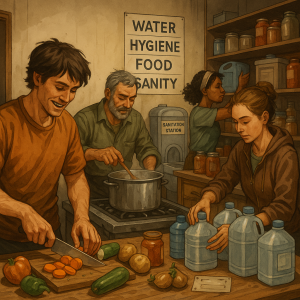
Everyone pitches in in a crisis
Prepping for the Unexpected Guests You Didn’t Invite
When Hospitality Meets Crisis Management
You’ve done the work. Your pantry’s stocked, your water’s filtered, and you’ve even figured out how to rig a solar oven for cooking. You’re ready for anything. Except… the doorbell rings, and suddenly, your entire “self-reliance” plan feels like it’s under siege by an uninvited guest—or ten. Maybe it’s a neighbor who shows up with their entire family, or a group of friends who “just happened to be in the area.”
Now, you’re left with a crucial decision: How do you feed, house, and manage all these people without depleting your supplies or losing your mind?
Here’s the thing: in a crisis, “tactical hospitality” isn’t just about opening your door and offering a meal. It’s about making sure everyone who walks in is ready to roll up their sleeves and help. Think of it as a survival team, not a slumber party. The real question isn’t whether you’ve got enough food—it’s whether you have enough water, space, and sanitation to handle the growing numbers. In this article, we’ll dive into how to handle these surprise guests while keeping your preparedness plan intact—and not having a meltdown in the process.
1. Make Everyone Earn Their Keep
Hospitality in a crisis is about shared responsibility. If you open your door to people, they need to work. This isn’t just about putting them on dish duty after dinner. This is about survival, and everyone needs to pitch in with something productive that supports the group’s well-being.
Assign roles right away. No one gets to lounge around playing Monopoly (or scrolling through social media) while everyone else is working. You could assign tasks like organizing supplies, prepping meals, maintaining security, or—one of the most important jobs—managing hygiene and water.
The more people you have, the more work needs to be divided. If your uninvited guests think they’re just here for a free ride, you’ll end up in a resource drain that could easily sink your preparedness efforts. Whether it’s gathering firewood, making a water run, or sanitizing the bathroom after every use—everyone has a responsibility. Even the kids can help by bringing in firewood, cleaning up the mess from a meal, or passing out rationed water.
If they balk, remind them that they’re not just freeloading—they’re part of the team. In a crisis, this isn’t about being polite; it’s about survival.
2. Prioritize Water and Hygiene (Medical Is #4 Principle, After All)
Water is your number one concern when guests arrive—especially uninvited ones. You’ve likely prepped for your own household, but now you’ve got extra mouths to hydrate. A sudden influx of guests can quickly stress your water supplies, so before worrying about food, you need to think about water. Can your current storage handle it? Do you have enough filters, or will you need to go into a rotation with boiling water?
If you’re reliant on rainwater or a well, you might be able to stretch your supplies a little, but once that’s gone, you’ll need a backup plan. Don’t forget about the water used for hygiene—bathing, washing hands, brushing teeth—and if you’ve got kids in tow, that’s going to multiply quickly.
Then there’s sanitation. Hygiene is often overlooked, but in a crisis, it’s crucial. Medical is #4 on the preparedness list for a reason, and hygiene plays a massive role in preventing illness and disease. If your porta potty can’t handle the added load, you may need to figure out alternative sanitation solutions. Consider using a bucket system with trash bags for waste, and ensure you have plenty of sanitation supplies—like hand sanitizer, disinfecting wipes, and biodegradable soap.
If you don’t already have a plan in place for your guests’ bathroom needs, you’ll need to build one quickly. Otherwise, your well-intentioned hospitality will quickly devolve into a health crisis. Ensure that your facilities can handle increased traffic, and create a rotation for bathroom use.
3. Food Is the Last Thing You Worry About (But You’ll Still Need a Plan)
While food is the number one “prepper” concern in most crisis scenarios, when it comes to uninvited guests, it’s actually the least urgent. That’s right—water and hygiene come first. So, hold off on cracking open the gourmet freeze-dried meals, because once you’ve established your water and sanitation systems, you can start thinking about food.
You’re going to have to ration, and that means being strategic. Sure, you might have 100 pounds of rice tucked away, but that doesn’t mean you should start cooking it all at once. Instead, get creative. Work with what you have. That bag of dried beans you’ve been saving? Perfect. Turn it into a soup or stew that can feed multiple people. The more people you have to feed, the more you’ll need to think in bulk and work with your resources wisely.
Get your guests involved in the process—have them chop vegetables, open cans, or even take turns stirring the pot. The goal here is to make food last as long as possible while avoiding food waste, and when everyone helps out, it’ll also give them a sense of ownership and teamwork. Bonus: they’re less likely to complain about the “limited menu” if they’ve helped prepare it.
4. Space and Comfort: Make It Work Without Losing Your Mind
You might have the space to accommodate guests, or you might not. Either way, you need to get creative. If your house is small, start converting rooms into multi-use spaces. A living room with cots and sleeping bags? Perfect. A guest room that now has 3 extra people in it? You’re going to need to make that work, too.
Consider setting up temporary sleeping areas outside, in the garage, or in any underutilized space. Your goal here is comfort without overloading any one area. Don’t forget that space isn’t just about physical room—it’s also about emotional space. If you’ve got guests for an extended period, they need to feel comfortable and secure. Set boundaries and make sure everyone knows where they’re sleeping, eating, and resting.
You may also need to create areas for “alone time” so that everyone doesn’t feel like they’re on top of each other. If the kids are running wild, it can quickly lead to chaos. Create a designated “quiet zone,” and encourage guests to take turns having a moment to themselves when they can.
5. Keep the Mood Light (Even if You Want to Pull Your Hair Out)
A good sense of humor can be your best tool when things start to feel like they’re spiraling. Crisis situations are stressful, and a room full of uninvited guests can quickly feel suffocating. But don’t let the tension get the best of you. Keep things lighthearted when possible—make a joke about how the “luxury suite” is the garage, or how you’re now a professional at rationing spaghetti.
And when the going gets tough, remember that you are the host. Be calm, be firm, and don’t be afraid to set boundaries—gently but with authority. In the end, a successful gathering of uninvited guests can serve as a reminder that being prepared isn’t just about the supplies you stock—it’s about keeping cool under pressure and managing the unexpected.
Tactical Hospitality Is About Balance
When the uninvited show up, it’s not a time for panic, but for tactical hospitality. Keep your focus on water, hygiene, and sanitation first. Then, get everyone involved in the process—because when people feel like part of the team, they’re much more likely to help you manage the crisis. And remember: just because they’re guests doesn’t mean they get a free pass. Everyone needs to contribute if you’re going to make it through together.
So, the next time someone knocks on your door in the middle of a crisis, you’ll be ready—not just to open the door, but to invite them into a system of survival and support that makes everyone feel like part of the family. Even if they’re not technically “family.”


